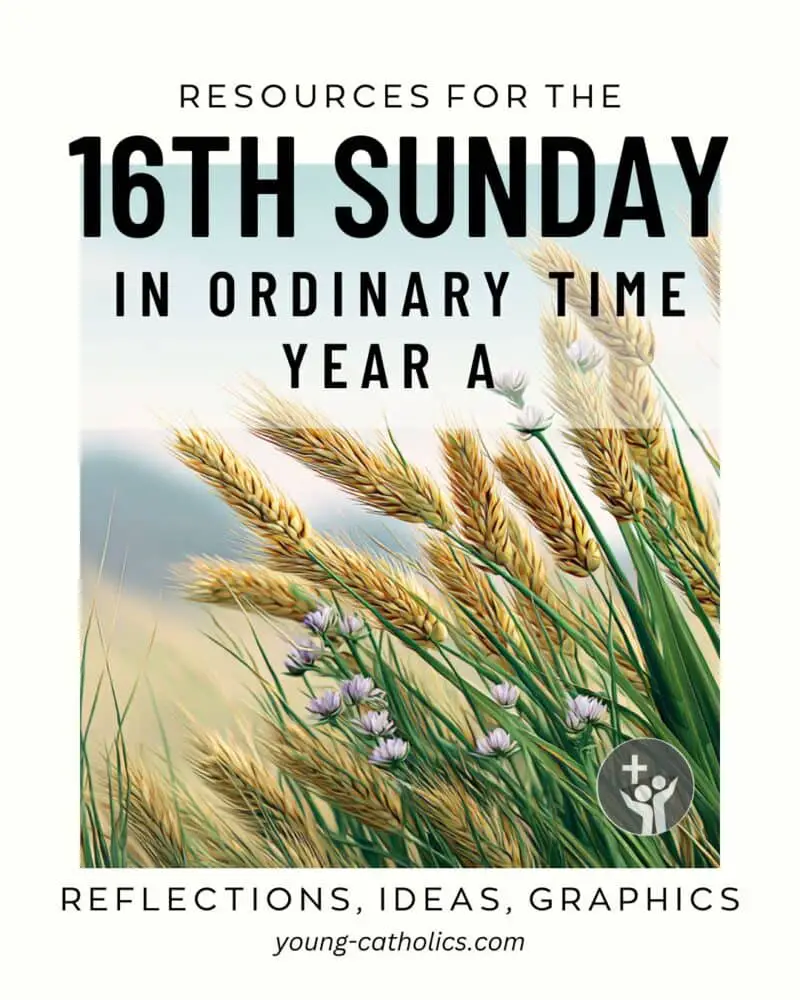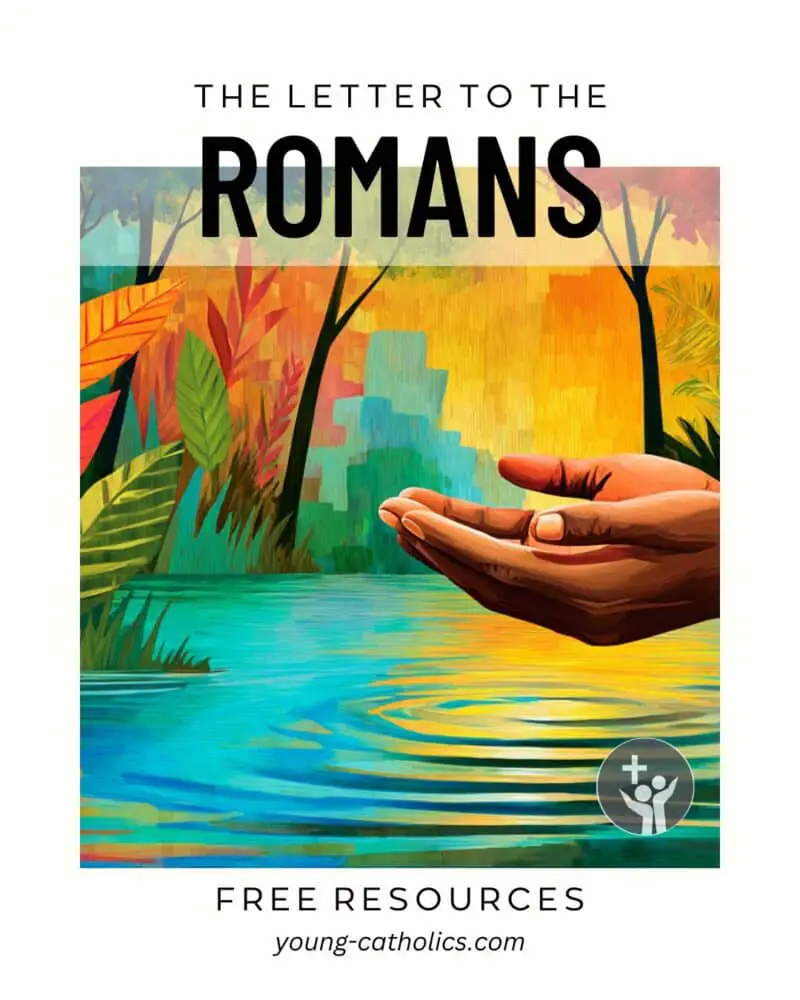16th Sunday in Ordinary Time Year A
Sunday July 19, 2026

Patience and the Kingdom
The 16th Sunday in Ordinary Time Year A invites us to think about God’s patience and care. The readings show us that God is powerful, but He is also gentle. He rules with justice, yet He gives time for change and forgiveness. This balance of strength and mercy is a theme throughout the readings.
In the first reading, we see how God’s might is joined with kindness. In the psalm, we hear about His mercy and faithfulness. The second reading reminds us that the Spirit helps us when we cannot find the right words to pray. Each passage points to a God who listens, forgives, and guides.
The Gospel brings these ideas together with parables about seeds, weeds, and yeast. The kingdom of God may look small at first, but it grows in hidden ways. The 16th Sunday in Ordinary Time Year A teaches us to trust in this growth and wait with hope.
Mass Readings for the 16th Sunday in Ordinary Time Year A
- First Reading – Wisdom 12:13, 16-19: There is only one God who cares for all, exercising justice, and demonstrating might. God teaches us that power is accompanied by kindness and provides hope through the possibility of repentance.
- Responsorial Psalm – Psalm 86: God is good, forgiving, and kind to those who call upon Him. All nations will worship Him for His wondrous deeds. He is merciful, patient, faithful, and gives strength to His servants.
- Second Reading – Romans 8:26-27: The Spirit assists us when we are unsure how to pray, speaking on our behalf in line with God’s will.
- Gospel – Matthew 13:24-43: Jesus tells a parable about a farmer who sowed good seeds in his field, but an enemy also sowed weeds among them. When the weeds grew, the farmer chose to let them coexist with the wheat until the harvest. He also shares parables of the mustard seed and yeast, illustrating the small beginnings and power of God’s kingdom.
The readings above are for lectionary cycle A. For other years see the links below:
16th Sunday in Ordinary Time Year B
16th Sunday in Ordinary Time Year C
Master, did you not sow good seed in your field? Where have the weeds come from?
Matthew 13:27
Themes for the 16th Sunday in Ordinary Time Year A
The 16th Sunday in Ordinary Time Year A focuses on God’s patience, mercy, and the growth of His kingdom. The readings show how God gives people time to change and how His kingdom grows in unexpected ways.
- God’s Justice and Mercy: God is strong but also kind. He gives people time to turn back to Him instead of punishing them right away.
- Patience in Growth: The parable of the wheat and weeds teaches that good and bad exist together for now. God waits until the right time to separate them.
- Power of Small Beginnings: The mustard seed and yeast show that God’s kingdom starts small but grows. What seems unimportant can have a big impact.
- The Spirit’s Help in Prayer: The Holy Spirit helps when people do not know what to say in prayer. God understands even when words fail.
- Hope for Repentance: God does not rush to punish but gives people chances to change. He wants them to turn back to Him.
- Trust in God’s Timing: The farmer in the parable waits for the right time to gather the harvest. God knows the right time to act in the world and in people’s lives.
The 16th Sunday in Ordinary Time Year A reminds people that God is patient and merciful. He gives time for growth and change, and His kingdom will grow in ways they may not expect.
Resources for the 16th Sunday in Ordinary Time Year A
Sunday July 19, 2026

The Book of Wisdom: God’s Power and Mercy
The book of Wisdom speaks of God as the true ruler who governs with both strength and gentleness. In this passage, we see that real authority is not harsh but caring. On the 16th Sunday in Ordinary Time Year A, this reading shows how God’s justice is never separated from mercy. His power gives hope because it allows room for repentance.
Wisdom often highlights God’s closeness to humanity and His guidance for right living. Here we learn that God is not like earthly rulers who use fear. Instead, He teaches us that kindness is part of strength. This fits the larger theme of Wisdom, where God’s ways are higher than human ways and guide us toward salvation.

Psalm 86: A God Who Listens
Psalm 86 reflects on God’s goodness and compassion. The psalmist calls out to the Lord, trusting that He is patient and faithful. On the 16th Sunday in Ordinary Time Year A, this psalm reminds us that prayer is always answered by a God who listens. It also celebrates that His mercy is not limited to one people but extends to all nations.
The psalm fits within the larger collection of prayers in the Psalter, which often express trust in God’s love despite hardship. Here, the focus is on God’s character: forgiving, merciful, and protective of His servants. This theme ties to the universal call of worship, showing that God’s works draw all creation to Him.

The Letter to the Romans: The Spirit Helps Us Pray
In Romans, Paul explains that the Spirit strengthens believers in their weakness. On the 16th Sunday in Ordinary Time Year A, this message highlights that prayer does not depend on our own words alone. Even when we cannot find the right words, the Spirit speaks within us, aligning our prayers with God’s will.
This passage fits with the main theme of Romans, where Paul emphasizes faith and the gift of salvation. The Spirit is central to life in Christ, guiding believers toward holiness and unity with God. It shows that God’s plan for redemption includes helping us every step of the way.
For further study, read this introduction to the Letter to the Romans.

The Gospel of Matthew: Seeds of the Kingdom
In Matthew’s Gospel, Jesus teaches through parables about God’s kingdom. On the 16th Sunday in Ordinary Time Year A, we hear how good seed grows alongside weeds until the harvest. The mustard seed and yeast also show how something small can grow into something great. These images reveal the hidden but powerful work of God’s kingdom.
Matthew often focuses on discipleship and the call to live according to God’s kingdom. These parables fit into that larger message, teaching patience, trust, and hope. Even when evil appears present, God’s plan is unfolding. The growth of the kingdom begins small but brings life to the world.
Homilies and Commentaries for the 16th Sunday in Ordinary Time Year A
Sunday July 19, 2026
Understanding Evil and Corruption
In this homily for the 16th Sunday in Ordinary Time, Bishop Robert Barron reflects on the famous parable of the wheat and the weeds. We should expect corruption and evil even within the best manifestations of the Kingdom of God. Evil is a corruption of the good and is parasitic upon it. Bishop Barron explains that dealing with evil requires delicacy, and sometimes only God can separate the wheat from the weeds. He also explores the possibility that God may permit evil for His ultimately good purposes, allowing certain virtues to shine forth. The homily calls for spiritual awareness and patience in navigating the complexities of good and evil in the world.
Embracing Diversity and Recognizing Significance
In this reflection by Jeff Cavins on the 16th Sunday in Ordinary Time Year A, he discusses two parables from Matthew’s gospel: the Parable of the Weeds among the Wheat and the Parable of the Mustard Seed. These parables highlight the diversity of God’s Kingdom and the Church’s goal of not seeking perfection in people. The first parable teaches us not to judge prematurely and harm the wheat by removing the weeds. Instead, we should trust God as the ultimate judge and focus on planting and watering. The second parable emphasizes the significance of small acts of faith, like the mustard seed, which can have far-reaching effects.
Wheat, Seed, and Leaven
In this homily for the 16th Sunday in Ordinary Time Year A, Bishop Robert Barron invites us to delve into the meaning of the three parables found in the 13th Chapter of Matthew’s Gospel. Acknowledging the wealth of insights these parables offer, Bishop Barron encourages the listeners to reflect upon them in the context of their own experiences of suffering and faith, as they collectively strive to seek and understand the Kingdom of God.
Of Wheat and Weeds
In this reflection on the 16th Sunday in Ordinary Time Year A, Scott Hahn highlights the teachings found in the day’s readings. God’s continuous teaching reveals His care for all people, extending His mercy even to those who defy Him, as long as they turn to Him in repentance. Jesus’ parables further illustrate the emergence and growth of the kingdom of God, emphasizing its hidden and improbable nature. Despite the coexistence of good and evil, God’s patience teaches us the importance of repentance and the gathering of all nations to worship Him. We must not lose heart as the harvest draws near, and we should commit ourselves to letting God’s Word bear fruit in our lives.
How Strange Is the Power of God
In this homily for the 16th Sunday in Ordinary Time Year A, Bishop Robert Barron expresses gratitude for the privilege of encountering the book of Wisdom from the Old Testament. He highlights the diverse collection of sayings and aphorisms in this book, emphasizing its focus on the wisdom, power, and love of God. Drawing attention to these prominent themes, Bishop Barron invites the congregation to reflect on the profound truths revealed within the passage for the day, and to consider the interplay between wisdom, power, and love in their own lives.
Reflection for the 16th Sunday in Ordinary Time Year A
The 16th Sunday in Ordinary Time Year A invites us to reflect on patience, growth, and trust in God’s work. The readings remind us that He does not rush to judge but gives time for change. His kingdom starts small but grows steadily, often in quiet and hidden ways. Through these reflections, we can consider how He is working in our own lives and how we can respond with faith.
Nurturing the Wheat Within
The Gospel for the 16th Sunday in Ordinary Time Year A tells the story of a farmer whose field has both wheat and weeds. Instead of pulling out the weeds right away, the farmer lets them grow together until the harvest. This parable teaches patience and reminds us that good and bad exist side by side in the world and in our own hearts.
We all have moments of kindness and moments of selfishness. At times, we choose love and mercy, but other times, we fall into anger, impatience, or sin. This parable encourages us to focus on growing the wheat within us—the goodness that God has planted in our hearts. Instead of worrying too much about the weeds, we should focus on strengthening what is good.
God gives us time to grow and change. He does not rush to judge but allows us the chance to choose Him again and again. We should not become discouraged by our struggles but trust that He is helping us to become more like Him.
Through prayer, repentance, and small daily choices, we can nurture the wheat in our lives. The 16th Sunday in Ordinary Time Year A reminds us to focus on growth, trust in God’s patience, and seek His help in becoming the people He calls us to be.
God’s Quiet Kingdom
The Gospel for the 16th Sunday in Ordinary Time Year A compares the kingdom of heaven to a mustard seed. Though it starts as the smallest of seeds, it grows into a large plant. This parable teaches that God’s kingdom does not come with sudden power but grows slowly and quietly over time.
Often, people expect God to act in big and obvious ways. They want clear signs or instant changes. But God often works in small, hidden ways that take time to develop. His grace moves quietly in people’s hearts, just as a tiny seed takes time to become a strong tree.
This parable encourages patience and trust. Even when we do not see results right away, God is still working. A simple act of kindness, a small moment of prayer, or a quiet decision to follow Him can lead to something much greater over time.
The 16th Sunday in Ordinary Time Year A reminds us to trust in God’s way of working. His kingdom is growing, even when we do not notice. We are invited to be part of that growth by living our faith in small but meaningful ways.
Unveiling Hidden Potential
The parable of the mustard seed in the Gospel for the 16th Sunday in Ordinary Time Year A shows how something small can grow into something great. This reminds us that small beginnings should not be ignored. God often uses what seems little or unimportant to bring about His plan.
Sometimes, people feel like their efforts do not matter. A simple prayer, a kind word, or a small act of love might seem too small to make a difference. But just like the mustard seed, these small things have the potential to grow into something much greater.
God does not measure things the way people do. He sees the value in every effort to love, serve, and trust Him. What seems small today may have a big impact later.
The 16th Sunday in Ordinary Time Year A invites us to trust that God is working through the little things. When we are faithful in small ways, He can bring great things from them.
Unleashing Influence
The Gospel for the 16th Sunday in Ordinary Time Year A also speaks about yeast mixed into flour. Though the yeast is small, it spreads through the entire dough, changing it completely. This parable teaches that faith and love, even in small amounts, can have a big effect.
Every person has the ability to influence others. A kind word, a patient response, or a small act of generosity can spread goodness far beyond what we see. Just like yeast affects the whole dough, one person’s faith can inspire others.
We may not always see the results of our actions right away. But this parable encourages us to keep living our faith, even when it feels small. Over time, those little moments of goodness add up and make a difference.
The 16th Sunday in Ordinary Time Year A reminds us that even the smallest acts of faith and love can bring change. God works through simple, everyday moments, and each of us has the chance to be part of that.
The 16th Sunday in Ordinary Time Year A teaches that even small acts of goodness and faith matter. God is patient with us, and He invites us to be patient with ourselves and others. His kingdom is growing, even when we cannot see it. By trusting in His plan and living our faith in small ways, we take part in His work.
Prayer
Lord, thank You for Your patience and kindness. Help me to trust in Your timing and to see the small ways You are working in my life. Give me the strength to choose what is good and to grow in faith each day. May I bring love and kindness to those around me. Amen.
Reflection Questions for the 16th Sunday in Ordinary Time Year A
- What does the parable of the wheat and weeds teach about patience and trust in God?
- How have you experienced God’s patience in your own life?
- What small acts of faith can you nurture, like the mustard seed?
- How can you spread goodness in quiet and unnoticed ways, like yeast in dough?
- What areas of your life need more trust in God’s timing?
- How do you respond when you see both good and bad in the world?
- What are some hidden ways God might be working in your life right now?
- How can you encourage others in their faith, even in small ways?
- What helps you stay patient when you do not see immediate results in your spiritual growth?
- How can you make space in your life for God’s quiet work to take root and grow?
Social Media Graphics and Bulletin Artwork for the 16th Sunday in Ordinary Time Year A
If you would like an image to be made available as a specific product (card, poster, mug, etc.) or as an extra high resolution image for personal use just post a comment about what you want and we will create a link to our online store for you.
Wheat and Weeds in the Sunlight

Bring the Gospel message of the 16th Sunday in Ordinary Time Year A to life with this beautiful image. Perfect for bulletins, newsletters, or parish materials, it captures the parable of the wheat and the weeds with clarity and meaning.
Download this artwork to share the theme of patience, growth, and hope with your community this week.
Paid subscribers may download a large copy this digital artwork without watermarks, suitable for use in bulletins, social media, newsletters, etc., free of charge by clicking here. You must be logged in as a paid subscriber to access the file.
Only current paid subscribers have the rights to use the artwork.

Pope Francis
Music Suggestions for the 16th Sunday in Ordinary Time Year A
Sunday July 19, 2026
The music selections for the 16th Sunday in Ordinary Time Year A reflect themes of God’s kingdom, patience, and growth. Some songs focus on planting seeds of faith and waiting for them to grow, just like in the parables of the mustard seed and the wheat and weeds. Others highlight trust in God’s plan and His quiet work in the world. There are also songs of gathering, reminding us that God calls His people together as they grow in faith. Music about God’s mercy and forgiveness connects with the first reading, which speaks of His kindness and patience. Joyful songs of praise remind us that even small acts of faith can help build His kingdom.
- All People that on Earth Do Dwell
- As It Is in Heaven by Matt Maher
- As We Gather at your Table
- Bring Forth the Kingdom by Marty Haugen
- Build Your Kingdom Here by Rend Collective
- Burning in My Soul by Matt Maher
- Creator Spirit, Lord of Grace by Rabanus Maurus
- Gather Us In by Marty Haugen
- Gather Your People by Bob Hurd, Craig Kingsbury & Dominic MacAller
- God Has Chosen Me by Bernadette Farrell
- Here as in Heaven by Elevation Worship
- Joyful, Joyful, We Adore You
- Lord, You Are Good and Forgiving by Jamie Cortez
- Rightful Place by Steve Angrisano
- Seed, Scattered and Sown
- Sing to the Lord of Harvest
- The Sower’s Song by Andrew Peterson
- Unless a Grain of Wheat Shall Fall by Bernadette Farrell
- We Walk by Faith by Marty Haugen
Music directors and musicians can use these songs to support the message of the 16th Sunday in Ordinary Time Year A. These selections fit well with the readings and help the congregation reflect on the themes. Try incorporating some of them into your liturgy, and feel free to suggest other choices in the comments.
Questions and Answers for the 16th Sunday in Ordinary Time Year A
What does the wheat and weeds parable mean?
Jesus tells a story about a farmer who lets wheat and weeds grow together until harvest. This means that good and bad exist together in the world for now, but God will separate them at the right time.
Why does the farmer wait to remove the weeds?
The farmer waits because pulling the weeds too soon might harm the wheat. This teaches that God is patient and gives people time to change.
How does the mustard seed relate to God’s kingdom?
The mustard seed starts small but grows into a large plant. This shows that God’s kingdom begins in simple ways but grows into something great.
Why does Jesus compare God’s kingdom to yeast?
Yeast is small but spreads through the whole dough, making it rise. In the same way, faith can spread and change people’s hearts and communities.
What does the first reading teach about God?
It says that God is strong but also kind. He uses His power with mercy and does not rush to punish.
How does the Spirit help in prayer?
The second reading says that the Holy Spirit helps people when they do not know what to say. God understands even when words fail.
What does the 16th Sunday in Ordinary Time Year A teach about patience?
It teaches that God does not act too quickly to judge. He gives time for people to grow and change.
How does the 16th Sunday in Ordinary Time Year A show that small things matter?
The mustard seed and yeast show that small things can grow into something big. Even small acts of faith and kindness can have a lasting impact.
Why doesn’t God remove all evil right away?
God allows good and bad to exist together for now. He gives people time to turn back to Him before making His final judgment.
What lesson can we apply from the 16th Sunday in Ordinary Time Year A?
We can learn to trust God’s timing, be patient with ourselves and others, and believe that even small acts of faith can grow into something greater.
How can we live out the message of the wheat and weeds parable?
We can focus on growing in goodness instead of judging others. God calls us to be patient and trust Him to bring justice in the right time.
What does the 16th Sunday in Ordinary Time Year A teach about trust?
It reminds us that God is always working, even when we do not see results right away. We should trust that His plan is unfolding in the best way.
God’s Patience and the Growth of His Kingdom
The 16th Sunday in Ordinary Time Year A highlights God’s patience and kindness. The first reading reminds people that God is strong but also merciful. He gives people time to change instead of punishing them right away. This shows that His justice is always fair and filled with love.
The Gospel shares parables about wheat and weeds, a mustard seed, and yeast. The wheat and weeds grow together until harvest, showing that good and bad exist side by side for now. The mustard seed and yeast teach that God’s kingdom starts small but grows in ways people may not expect. God works in quiet and hidden ways to bring His plan to life.
The second reading reminds people that the Holy Spirit helps in prayer. Sometimes, people do not know what to say, but the Spirit speaks for them. This shows that God understands and listens, even when words fail. The 16th Sunday in Ordinary Time Year A invites people to trust in God’s timing and mercy.
Your Turn
The 16th Sunday in Ordinary Time Year A invites reflection on patience, growth, and trust in God. The readings show that He allows time for change and that His kingdom grows in unexpected ways. How have you seen His patience in your life?
Take a moment to think about the messages in these readings. Share your thoughts or experiences in the comments. Your reflection may help someone else grow in faith.


Leave a Reply